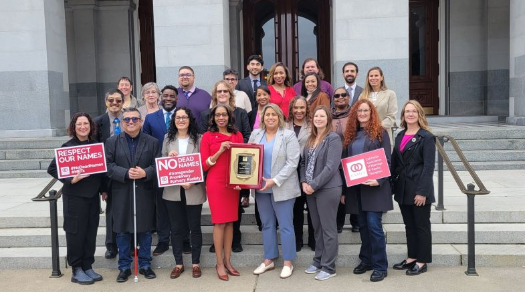We are dedicated to supporting the LGBTQ+ community through a multifaceted approach that includes advocacy, financial investment, comprehensive training, process improvement, enhanced representation, and proactive engagement on key issues.
Here are a few important highlights.
Important LGBTQ+ Advocacy Efforts
We at CAMFT continue to support the LGBTQ+ caucus, attending and sponsoring fundraising events in Sacramento and meeting with legislators who advocate for the LGBTQA+ community.
CAMFT honored Sen. Caroline Menjivar with our 'State Legislator of the Year Award' for her unwavering dedication to mental health rights. Her groundbreaking bill, SB 372 (Deadnaming), was proudly co-sponsored by CAMFT, and has been in effect since Jan 1, 2024. The legislation requires the BBS to use the licensees or registrant’s name and not reference a deadname in its online license verification system.
We hosted an event on the steps of the State Capitol to promote this legislation and the importance of respecting the names of licensees (and not to use deadnames). Board members and members-at-large joined us in this effort. We were particularly pleased that Senator Menjivar’s wife, also an MFT, attended the event. Our work on this legislation was amplified via several news outlets including CalMatters and The Capitol Morning Report, reaching key decision and policy makers in Sacramento and the news outlets’ readership at-large.

On June 9th, the CAMFT Board approved the motion to support the California Right to Marry proposition and Repeal Prop & Amendment proposition.
On August 22, 2025, CAMFT published our Statement Supporting the Rights of Transgender and Gender Expansive People.
Our Board of Directors
Representation matters. We are pleased to have members from the LGBTQ+ community serve on CAMFT’s Board who provide valuable lived experience to the Board’s overall direction.
Educational and Supportive Resources for Therapists
We are honored to have several presenters speak on topics that support LGBTQ+ concerns at our Annual Conferences, including presentations on Gender Affirming Care, Diversity-Affirming Approaches to Working with Neurodivergent and Trans/Non-binary Adults and Youth, and Empowering Trans-Erotic Wellness. We've published articles in The Therapist magazine on Gender Affirming Care, Queerphobia and Intimate Partner Violence, Minor's Consent for Treatment and Cultural Competency.
CAMFT also provides a safe space at our Annual Conferences for LGBTQ+ members to meet while attending the event. Our community meet-ups provide an opportunity to find a deeper community within CAMFT and to build networks of support while attending the conference.
In the News
On June 7, 2024, our Executive Director, Joy Alafia, was interviewed by KTVU Fox News in the San Francisco Bay Area. The reporters referenced CDC data showing that LGBTQ+ adults are twice as likely to be diagnosed with depression and nearly a third report poor mental health. Joy highlighted the emotional toll of the current political climate, exacerbated by anti-LGBTQ+ legislation, particularly for LGBTQ+ people of color.
In the interview, Joy emphasized the need to eliminate the stigma around therapy and to reduce barriers to accessing care. She stressed the importance of increasing the number of therapists from the LGBTQ+ community and outlined steps to improve the pipeline. Additionally, she highlighted the significance of culturally competent care and emphasized that CAMFT provides training on gender-affirming care.

DEI Training
We have provided ongoing DEI training for our staff and Board, with the next session scheduled for this month. Continuous DEI training is crucial as it fosters a more inclusive and equitable environment, ensuring that our team remains informed and committed to these values.
CAMFT is also instituting DEI training for our committee volunteers for the 2024-2025 term.
Updated Editorial Guidelines
Our editorial process ensures that our communications align with our mission and DEI values. Here are a few of the criteria for communications:
- Ethical communication with inclusivity and cultural sensitivity;
- Non-oppressive terms and equitable representation;
- Follow evidenced-based research and clinical best practices from reputable sources;
- Must be respectful in tone;
- Communications that potentially impact marginalized groups or touch on current controversial social themes, may go through an approval process before being shared through any CAMFT platforms;
- Employ professional readers with cultural competencies to help address any unconscious bias.